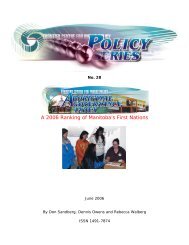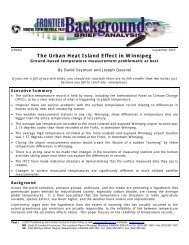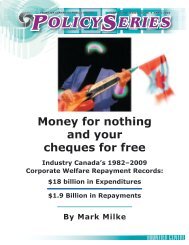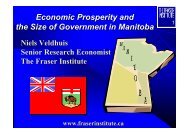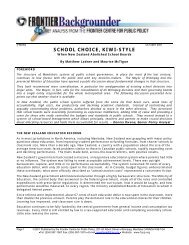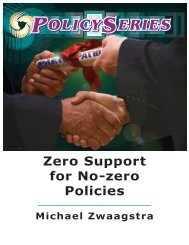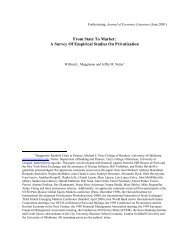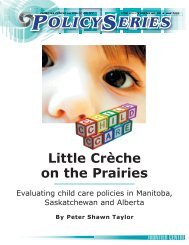View the Entire Report - Frontier Centre for Public Policy
Create successful ePaper yourself
Turn your PDF publications into a flip-book with our unique Google optimized e-Paper software.
(CP001) MAY 2002<br />
INNER-CITY PUBLIC POLICY<br />
Empower Local Citizens<br />
Executive Summary<br />
By Rev. Larry Gregan<br />
• Although <strong>the</strong> inner city is intimately involved with <strong>the</strong> public sector, this fact may inhibit <strong>the</strong><br />
ability of its residents to lead dynamic, self-directed lives.<br />
• Reversing <strong>the</strong> decline of <strong>the</strong> inner-city housing stock requires direct involvement by residents in<br />
maintenance and en<strong>for</strong>cement policies.<br />
• Widening <strong>the</strong> pool of af<strong>for</strong>dable low-income housing is a necessary condition of eliminating rent<br />
control.<br />
• Re<strong>for</strong>ms to welfare policy should include <strong>the</strong> removal of financial restrictions that discourage<br />
<strong>the</strong> growth of self-directed family units.<br />
• Zoning processes have become politicized, and marginalize <strong>the</strong> interests and concerns of<br />
residents.<br />
• <strong>Public</strong> health ef<strong>for</strong>ts that focus on prevention through peer-based activity are more likely to<br />
succeed.<br />
• The process <strong>for</strong> enabling non-profit community initiatives is hopelessly inappropriate. Several<br />
changes in law are needed to harness this vehicle <strong>for</strong> inner-city revival.<br />
• The City needs to change its tax policies to stop inner-city subsidization of <strong>the</strong> suburbs.<br />
• Allowing residents a voice in <strong>the</strong> deployment of police resources is <strong>the</strong> key to safer streets.<br />
• High-per<strong>for</strong>ming public schools are vital to <strong>the</strong> reversal of poverty and decline.<br />
In <strong>the</strong> inner city, <strong>the</strong>re is more involvement in <strong>the</strong> lives of citizens by civic bureaucrats, social<br />
service professionals, law en<strong>for</strong>cement personnel, health care workers, and politically active<br />
agencies than in any o<strong>the</strong>r segment of our society.<br />
The responses of <strong>the</strong>se professionals to <strong>the</strong> challenges of <strong>the</strong>se highly dynamic neighborhoods tend<br />
to be static: program and agency based. The effect is not unlike colonization in <strong>the</strong> third world.<br />
Private sector opportunists also make a good living here and invest in maintaining <strong>the</strong> status quo.<br />
The well being of <strong>the</strong> resident population is not <strong>the</strong>ir primary concern.<br />
Yet, <strong>the</strong> goal of good public policy should be <strong>the</strong> same here as anywhere else:<br />
• <strong>the</strong> freedom of citizens to participate in personal and public life.<br />
• consistency of treatment with o<strong>the</strong>r jurisdictions.<br />
• high value/high per<strong>for</strong>mance service.<br />
The key is to implement policies that allow and encourage <strong>the</strong> ongoing self-directed involvement of<br />
citizens.<br />
Page 1<br />
©2002 Published by <strong>the</strong> <strong>Frontier</strong> <strong>Centre</strong> <strong>for</strong> <strong>Public</strong> <strong>Policy</strong>, 201-63 Albert Street • Winnipeg, Manitoba CANADA R3B 1G4<br />
•Tel: (204) 957-1567 Fax: (204) 957-1570 • E-mail: newideas@fcpp.org • Website: www.fcpp.org
Housing Maintenance<br />
The most visible sign of inner-city problems is <strong>the</strong> deterioration of <strong>the</strong> housing stock. This<br />
discourages ongoing maintenance, let alone increased investment. As housing becomes scarce and<br />
less desirable <strong>for</strong> families, school enrollments decline. This, in turn decreases enrollment-based<br />
funding <strong>for</strong> attractive school programs, and that fur<strong>the</strong>r discourages family residence. The coupling<br />
of low rents and poor living conditions is usually tolerated only by persons unable or unwilling to<br />
participate in ongoing self-maintenance. This leads to fur<strong>the</strong>r decline. The public, commercial, and<br />
professional life of <strong>the</strong> neighborhood <strong>the</strong>n increasingly seems to center on its concentration of<br />
poverty, addiction, abuse, ill health, and family instability.<br />
The means to prevent, and even reverse, <strong>the</strong> concentration promoted by such decline are at hand<br />
in by-laws already on <strong>the</strong> books. Standards regarding property maintenance, health, and safety<br />
already exist to address <strong>the</strong>se concerns on an ongoing basis. Application of <strong>the</strong>se policies breaks<br />
down because of inadequate staffing and funding <strong>for</strong> inspections, laxity on <strong>the</strong> part of inspectors,<br />
and <strong>the</strong> requirement of community complaints be<strong>for</strong>e proceeding.<br />
This could be effectively addressed by removing professional and union barriers to citizen<br />
participation. If mandatory community inspection teams regularly accompanied inspectors <strong>the</strong>y<br />
would be well in<strong>for</strong>med, preceded by, assisted, and accountable to those most affected by <strong>the</strong>ir<br />
work.<br />
Revenue Property Income<br />
There are many legal requirements <strong>for</strong> investment in property maintenance affecting value, health,<br />
and safety. On <strong>the</strong> o<strong>the</strong>r hand, <strong>the</strong>re is <strong>the</strong> reality of declining real-dollar revenues from controlled<br />
rents and artificially low welfare rates on <strong>the</strong> o<strong>the</strong>r.<br />
But rent control has <strong>the</strong> same emotional resonance <strong>for</strong> <strong>the</strong> poor as tax relief does <strong>for</strong> <strong>the</strong> rich. And,<br />
just as bringing government deficits under control is a prerequisite to reducing taxes, increasing<br />
<strong>the</strong> ability of low-income tenants to pay uncontrolled rents is a prerequisite <strong>for</strong> removing rent<br />
control.<br />
It is possible <strong>for</strong> a commitment to pay market rents <strong>for</strong> qualified welfare recipients to accompany a<br />
robust policy of reducing long-term welfare dependence by employable persons.<br />
Welfare Re<strong>for</strong>m<br />
The goal of welfare re<strong>for</strong>m should be to increase <strong>the</strong> ability of willing people to provide <strong>for</strong><br />
<strong>the</strong>mselves and direct <strong>the</strong>ir own lives.<br />
The disincentive to moving up to <strong>the</strong> next rung of <strong>the</strong> economic ladder can be removed by<br />
continuing to provide dental, vision and o<strong>the</strong>r such benefits based on income ra<strong>the</strong>r than an<br />
unrealistically brief time limit.<br />
Like third world colonies, hundreds of millions of dollars flow through inner city neighborhoods but<br />
little remains <strong>the</strong>re.<br />
Non-resident landlords build up equity from welfare rents but welfare recipients who choose to<br />
spend <strong>the</strong>ir payments wisely are prevented from saving, ei<strong>the</strong>r in <strong>the</strong> <strong>for</strong>m of home equity or, more<br />
ironically, in <strong>the</strong> <strong>for</strong>m of registered education savings programs. If a concerned non-parent opens<br />
an RESP, he/she does not receive <strong>the</strong> matching federal government contribution of up to<br />
$400/year available to parents. This works against <strong>the</strong> well-founded belief that education is key to<br />
overcoming poverty.<br />
Zoning<br />
A pet peeve of inner city residents is that non-resident helpers do not have to live with <strong>the</strong><br />
investment and land-use consequences of <strong>the</strong>ir solutions.<br />
Rightly applied, zoning returns authority to those affected by planning and land use decisions<br />
which, in turn, will actually encourage ra<strong>the</strong>r than encumber investors.<br />
Page 2<br />
©2002 Published by <strong>the</strong> <strong>Frontier</strong> <strong>Centre</strong> <strong>for</strong> <strong>Public</strong> <strong>Policy</strong>, 201-63 Albert Street • Winnipeg, Manitoba CANADA R3B 1G4<br />
•Tel: (204) 957-1567 Fax: (204) 957-1570 • E-mail: newideas@fcpp.org • Website: www.fcpp.org
Most appeals of <strong>the</strong> zoning and licensing decisions made by <strong>the</strong> civic Board of Adjustment are not<br />
true appeals based on inconsistent application of policy or inclusion of previously unknown relevant<br />
in<strong>for</strong>mation; <strong>the</strong>y are simply attempts to do an end run around public policy at <strong>the</strong> political level<br />
where leverage is perceived to be greater.<br />
Investors may perceive zoning to be <strong>the</strong> problem when city planners oppose allowing residential<br />
use in a potentially vital downtown business district. Few business owners located <strong>the</strong>re would<br />
oppose more residential housing. Zoning per se is not <strong>the</strong> problem; <strong>the</strong> problem is a decision<br />
making process which marginalizes <strong>the</strong> community most affected by <strong>the</strong> land use. Community selfinterest<br />
and support <strong>for</strong> licensing and land use decisions <strong>for</strong>m a predictable commitment that<br />
increases <strong>the</strong> confidence <strong>for</strong> profitable investment.<br />
<strong>Public</strong> Health<br />
The, by definition, top-down activity of disease treatment is not only inevitably more expensive<br />
than prevention, it is less effective in promoting public health. By necessity, third world<br />
communities have shown that low cost, community driven, peer based activities are what actually<br />
work in promoting health and reducing disease such as HIV.<br />
This should not come as a surprise and should provoke wonder that this approach is not pursued in<br />
all areas of public policy.<br />
Non-Profit Participation<br />
Even when poverty, addiction, abuse, ill health, and family instability are not concentrated in one<br />
area, a compassionate response could be much more effective.<br />
Proposed solutions to inner-city problems usually have an all-too-common trajectory. First,<br />
agencies with broad goals identify <strong>the</strong> specific activity currently receiving political and bureaucratic<br />
support and lobby <strong>for</strong> a proposal centered on that.<br />
One or more levels of government <strong>the</strong>n approve funding <strong>for</strong> a program and its administrative<br />
personnel. Then a local presence is established. A small polling of <strong>the</strong> population and/or a few<br />
hands raised at a public meeting are <strong>the</strong>n cited as community support and democratic legitimacy.<br />
The program runs its course. Then, because <strong>the</strong> problem still exists and <strong>the</strong> service deliverers are<br />
set up to remain employed, programs are expanded, or more created, and funding found.<br />
In <strong>the</strong> muddle of good intentions, limited ability, and mixed motives, <strong>the</strong> colonizers rightly perceive<br />
that <strong>the</strong> key to any present or ongoing solution is <strong>the</strong> “empowerment” of people. Yet <strong>the</strong>ir inability<br />
to effect “empowerment” <strong>for</strong> citizens is revealed by <strong>the</strong> fact that <strong>the</strong> greatest “empowerment”<br />
always seems to rest with <strong>the</strong> “helpers”.<br />
Community residents already have many associations among <strong>the</strong>mselves and with o<strong>the</strong>rs.<br />
Groupings of residents in non-profits, faith based organizations, and charitable foundations often<br />
work through issues in a leaner and more responsive manner.<br />
A few catalysts to this source of self-renewing activity would help <strong>the</strong> inner city greatly:<br />
• Allowing tax receipts to be given <strong>for</strong> services (not just “real property”).<br />
• A tax regime that is more favorable to <strong>the</strong> success of charitable foundations than government<br />
bureaucracies.<br />
• Allowing public purchase of services from faith-based deliverers.<br />
The modern understanding of a secular society prevented en<strong>for</strong>cement of any one faith by<br />
disallowing any faith in <strong>the</strong> public sphere. The post-modern understanding allows permission <strong>for</strong><br />
each person or group to participate in our common values and goals according to <strong>the</strong>ir own story<br />
and tradition. This <strong>the</strong>oretically more respectful approach could be more consistently applied in<br />
practice.<br />
Page 3<br />
©2002 Published by <strong>the</strong> <strong>Frontier</strong> <strong>Centre</strong> <strong>for</strong> <strong>Public</strong> <strong>Policy</strong>, 201-63 Albert Street • Winnipeg, Manitoba CANADA R3B 1G4<br />
•Tel: (204) 957-1567 Fax: (204) 957-1570 • E-mail: newideas@fcpp.org • Website: www.fcpp.org
Taxation<br />
The solution often proposed to curtail costly suburban development and <strong>for</strong>ce more cost-effective<br />
high-density development is to simply not allow it. A consistent, less restrictive, and more effective<br />
solution would be to simply stop subsidizing it.<br />
We only get more of whatever we subsidize. If living in a service delivery area with lower per unit<br />
cost provided a more substantial tax benefit and people obtaining housing in areas where public<br />
service and infrastructure cost more paid <strong>the</strong> full cost through taxation, <strong>the</strong> appropriate level of<br />
each would be reached by choice ra<strong>the</strong>r than intervention.<br />
Safety<br />
The outrage of inner city residents is often used by police departments to obtain more funding but<br />
<strong>the</strong>se communities rarely get to have substantial input into ei<strong>the</strong>r <strong>the</strong> deployment of <strong>the</strong>se<br />
additional resources or collective agreements that govern deployment.<br />
Education<br />
Education is only <strong>the</strong> way out of poverty if children actually learn. What we take into our minds<br />
through education is as important and intimate a choice as what we eat. All aspects of education<br />
policy must <strong>the</strong>re<strong>for</strong>e be built on parental involvement, measured per<strong>for</strong>mance, and choice.<br />
Assumptions regarding <strong>the</strong> limitations of inner city children’s capabilities must not be used as<br />
excuses to not achieve <strong>the</strong>ir education. The key questions are, what do you want <strong>for</strong> yourself, do<br />
you want it <strong>for</strong> o<strong>the</strong>rs, and what are you willing to do to achieve it <strong>for</strong> us all.<br />
About <strong>the</strong> author<br />
Rev. LARRY GREGAN arrived from <strong>the</strong> Miramichi River, New Brunswick, in 1986 and Winnipeg is now very<br />
much his home. After completing a Master of Divinity degree at Providence Seminary in 1993, he moved to<br />
<strong>the</strong> inner city to intern with Rev. Harry Lehotsky at New Life Ministries. He was ordained in 1997 and<br />
continues as an associate pastor <strong>the</strong>re. With <strong>the</strong> help of Lazarus Housing, he and his wife are now well settled<br />
in a recently renovated house on Maryland Street. Larry is involved daily in <strong>the</strong> effects of public policy on <strong>the</strong><br />
lives of Winnipeg’s poorest and most vulnerable citizens. As a fellow neighbour, he too lives with <strong>the</strong><br />
consequences of new policy solutions and speaks about urban renewal from <strong>the</strong> perspective of an inner city<br />
resident.<br />
<strong>Frontier</strong> Community Pulse - is a <strong>for</strong>um <strong>for</strong> <strong>the</strong> views of local community leaders who live and work in communities most<br />
affected by public policy. The views expressed are <strong>the</strong>ir own, and do not necessarily reflect <strong>the</strong> opinions of <strong>the</strong> members or<br />
board of <strong>the</strong> <strong>Frontier</strong> <strong>Centre</strong> <strong>for</strong> <strong>Public</strong> <strong>Policy</strong>.<br />
Copyright © 2002 by <strong>the</strong> <strong>Frontier</strong> <strong>Centre</strong> <strong>for</strong> <strong>Public</strong> <strong>Policy</strong><br />
Date of Issue: May 2002<br />
ISSN 1491-7874<br />
The <strong>Frontier</strong> <strong>Centre</strong> <strong>for</strong> <strong>Public</strong> <strong>Policy</strong> is an independent public policy think tank whose mission is to explore options <strong>for</strong> <strong>the</strong> future by<br />
undertaking research and education that supports economic growth and opportunity. You can reach us at: 201-63 Albert Street • Winnipeg,<br />
Manitoba CANADA R3B 1G4 •Tel: (204) 957-1567 Fax: (204) 957-1570 • E-mail: newideas@fcpp.org • Website: www.fcpp.org<br />
Page 4<br />
©2002 Published by <strong>the</strong> <strong>Frontier</strong> <strong>Centre</strong> <strong>for</strong> <strong>Public</strong> <strong>Policy</strong>, 201-63 Albert Street • Winnipeg, Manitoba CANADA R3B 1G4<br />
•Tel: (204) 957-1567 Fax: (204) 957-1570 • E-mail: newideas@fcpp.org • Website: www.fcpp.org




